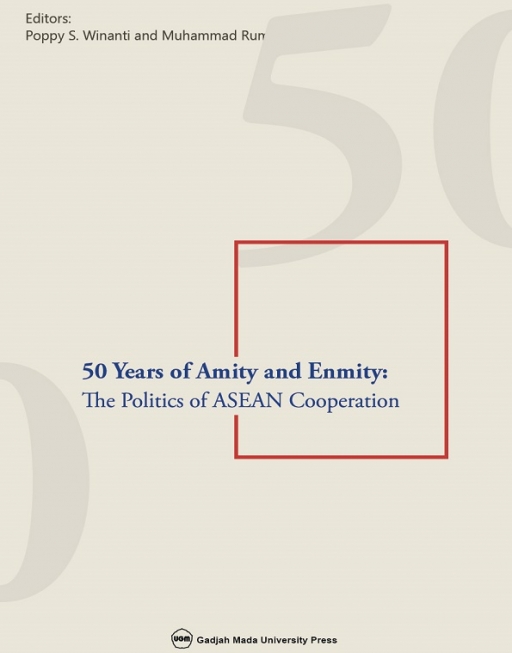
50 Years Of Amity And Enmity : The Politics Of ASEAN Cooperation
Politik / Hubungan Negara Asean / Asean
Jenis Bahan
Monograf
Judul Alternatif
-
Pengarang
Poppy S. Winanti (Penyunting) ; Muhammad Rum (Penyunting)
Edisi
cetakan pertama
Pernyataan Seri
-
Penerbitan
Yogyakarta : Gadjah Mada University Press, 2018; ©2018 Gadjah Mada University Press
Bahasa
Inggris
Deskripsi Fisik
x, 314 halaman : ilustrasi ; 24 cm
Jenis Isi
teks
Jenis Media
tanpa perantara
Penyimpanan Media
volume
ISBN
9786023862924
ISSN
-
ISMN
-
Bentuk Karya
-
Target Pembaca
Dewasa
Catatan
Indeks: halaman 301-308
Abstrak
This book intends to offer an alternative lens for regionalism studies in Southeast Asia. Despite of its widely acknowledged status as one of the most successful regionalism, ASEAN still suffers from numerous obstacles. Yet, in the midst of ASEAN uncertain future trajectories, there is only limited consensus on how to approach ASEAN regionalism. Scholars of ASEAN regionalism tend to use ASEAN identity as the main explanation of cooperation among ASEAN member states. However, this approach suffers from limitations. Emphasis on static, traditional, and all-encompassing identity has made issue-specific cooperation and its internal dynamics neglected. The way issue-specific cooperation alters ASEAN architectures also remains understudied. By shifting attentions to issue-specific cooperation, this book attempts to fully grasp the dynamics of 50 years of ASEAN cooperation. Why could ASEAN member states reach consensus in certain issues—ranging from energy, environment, human rights, disaster management, human security, to infectious disease—albeit ASEAN values such as non-interference and informality? How do these practices of cooperation reshape the idea of ASEAN values? Will the changing practice of issue-specific cooperation spillover to the strengthening of ASEAN regionalism?
| No. Barcode | No. Panggil | Lokasi Perpustakaan | Lokasi Ruangan | Kategori | Akses | Ketersediaan |
|---|---|---|---|---|---|---|
| 00006101245 | 352.1159 FIF |
Perpustakaan Jakarta - Cikini Jln. Cikini Raya No. 73, Komplek Taman Ismail marzuki, Jakarta Pusat |
Cikini Umum - Lantai 4 dan Lantai 5 | Storage Umum | Dapat dipinjam | Tersedia |
| No. | Nama File | Nama File Format Flash | Format File | Aksi |
|---|---|---|---|---|
| Tidak ada data. | ||||
| Tag | Ind1 | Ind2 | Isi |
|---|---|---|---|
| 001 | INLIS000000000846853 | ||
| 005 | 20230815014355 | ||
| 006 | a####e########1### | ||
| 007 | ta | ||
| 008 | 230815#########yoia###e########1###eng## | ||
| 020 | # | # | $a 9786023862924 |
| 035 | # | # | $a 0010-0823000506 |
| 040 | # | # | $a JKPDJAK$b ind$c rda |
| 041 | 0 | # | $a eng |
| 082 | 0 | 4 | $a 352.1159$2 [23] |
| 084 | # | # | $a 352.1159 FIF |
| 245 | # | # | $a 50 years of amity and enmity : $b the politics of ASEAN cooperation /$c editor, Poppy S. Winanti, Muhammad Rum |
| 250 | $a cetakan pertama | ||
| 264 | # | 1 | $a Yogyakarta :$b Gadjah Mada University Press,$c 2018 |
| 264 | # | 4 | ,$c ©2018 Gadjah Mada University Press |
| 300 | # | # | $a x, 314 halaman : $b ilustrasi ; $c 24 cm |
| 336 | # | # | $a teks$2 rdacontent |
| 337 | # | # | $a tanpa perantara$2 rdamedia |
| 338 | # | # | $a volume$2 rdacarrier |
| 500 | # | # | $a Indeks: halaman 301-308 |
| 520 | # | # | $a This book intends to offer an alternative lens for regionalism studies in Southeast Asia. Despite of its widely acknowledged status as one of the most successful regionalism, ASEAN still suffers from numerous obstacles. Yet, in the midst of ASEAN uncertain future trajectories, there is only limited consensus on how to approach ASEAN regionalism. Scholars of ASEAN regionalism tend to use ASEAN identity as the main explanation of cooperation among ASEAN member states. However, this approach suffers from limitations. Emphasis on static, traditional, and all-encompassing identity has made issue-specific cooperation and its internal dynamics neglected. The way issue-specific cooperation alters ASEAN architectures also remains understudied. By shifting attentions to issue-specific cooperation, this book attempts to fully grasp the dynamics of 50 years of ASEAN cooperation. Why could ASEAN member states reach consensus in certain issues—ranging from energy, environment, human rights, disaster management, human security, to infectious disease—albeit ASEAN values such as non-interference and informality? How do these practices of cooperation reshape the idea of ASEAN values? Will the changing practice of issue-specific cooperation spillover to the strengthening of ASEAN regionalism? |
| 521 | # | # | $a dewasa |
| 650 | # | 4 | $a ASEAN |
| 650 | # | 4 | $a Hubungan Negara ASEAN |
| 650 | # | 4 | $a Politik |
| 700 | 0 | # | $a Muhammad Rum$e Penyunting |
| 700 | 0 | # | $a Poppy S. Winanti$e Penyunting |
| 850 | # | # | $a JKPDJAK |
| 990 | # | # | $a D019264/23 |